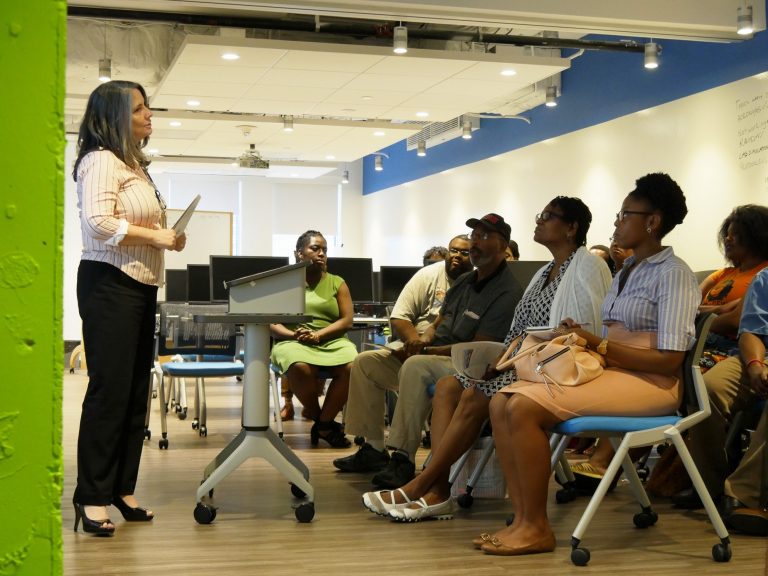This post is part of a series highlighting the impact of our grantmaking through the Greater Washington Workforce Development Collaborative. Launched in 2008, this coalition of funders aligns its investments in effective, data-driven workforce development efforts. Grantees are selected to receive funding and lead sector partnerships. Byte Back is one of three grantees from our most recent round of awards.
Byte Back Training Manager Ellen Bredt speaks to prospective EPIC students in August 2017.
Unemployment in the District of Columbia ranges from ward to ward, with the highest being in the city’s lowest income neighborhoods. Byte Back, a DC-based nonprofit organization, was founded in 1997 to help open doors to living wage jobs for low-income residents through IT training. To date, thousands of economically disadvantaged students in Washington, DC and neighboring Prince George’s County have been served, acquiring marketable skills and obtaining meaningful employment.
In early 2017, Byte Back received a grant from The Community Foundation’s Greater Washington Works initiative. The organization was selected to lead an IT sector partnership to train and place DC and Prince George’s County residents for Computer User Support Specialist occupations. In the fall of 2017, Byte Back launched the Education Partnership for IT Careers (EPIC) program with the Prince George’s County Economic Development Corporation. This program made way for expansion into Prince George’s County, marking the first time the organization offered certification courses outside of the District. Their employer partners include: ANGARAI, PC Metro, OCTO; International Software Systems, Inc., NucoreVision, SAGE Services Group, Soft-Con Enterprises, Inc., and SSAI Science Systems and Applications, Inc.
The program has paved opportunities for active employer partners to connect directly with participants and help them launch careers in IT. One such example is Ms. Kristina Francis of EsteemLogic, an IT consulting and training firm. Ms. Francis is an active participant in EPIC’s strategic meetings and contributes to developing participants’ careers. Three EPIC participants will be referred through EsteemLogic’s apprenticeship program, which helps develop soft skills and ensure placement in careers that use their newly acquired tech skills. Participants also receive access to professional development, mentorship, and internships. Click here to learn more about EPIC and its impact.
Greater Washington Works is a signature grantmaking initiative of the Greater Washington Workforce Development Collaborative, a coalition of local workforce investors who share a common commitment to addressing poverty and income inequality by helping workers advance their skills and credentials so they can earn family-sustaining wages. Greater Washington Works is a $1 million grantmaking initiative of the Collaborative designed to address local employer hiring challenges by meeting the talent needs of local IT and Healthcare employers. Greater Washington Works will support at least 250 local workers to launch living-wage careers in the IT and Healthcare sectors.
In 2018, the Collaborative celebrates its 10th anniversary. To learn more and get involved, visit http://www.gwwdc.org.




